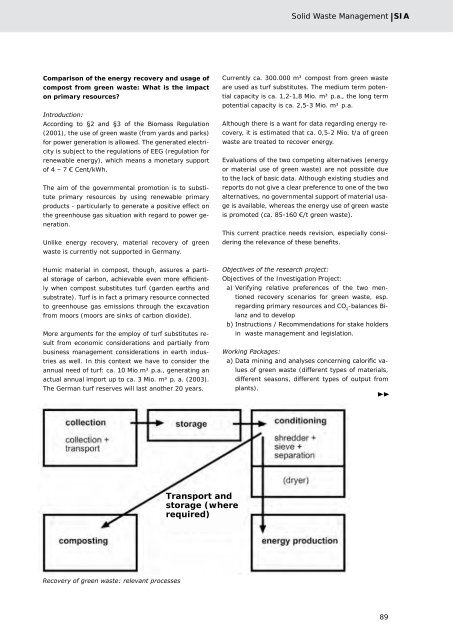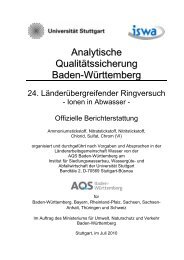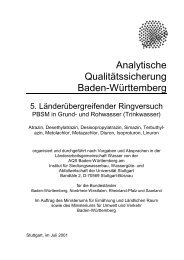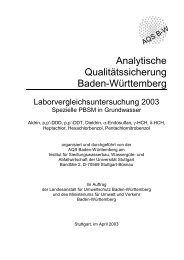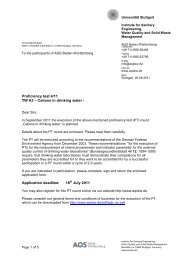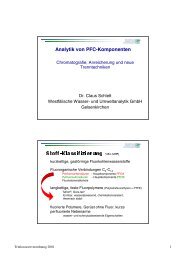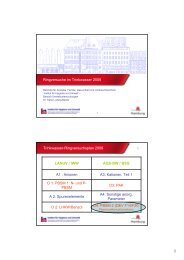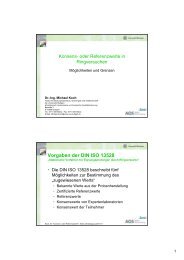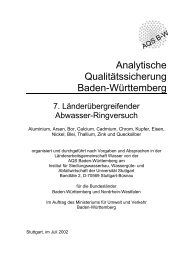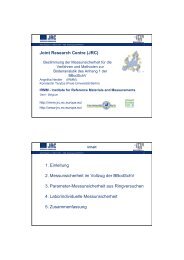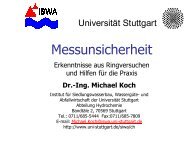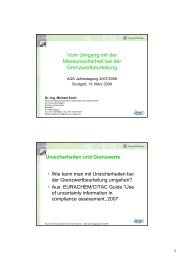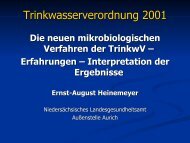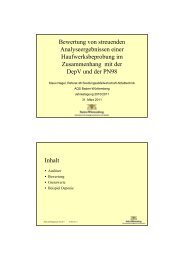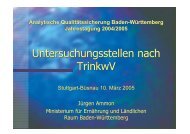Institute for Sanitary Engineering, Water Quality and Solid Waste ...
Institute for Sanitary Engineering, Water Quality and Solid Waste ...
Institute for Sanitary Engineering, Water Quality and Solid Waste ...
You also want an ePaper? Increase the reach of your titles
YUMPU automatically turns print PDFs into web optimized ePapers that Google loves.
<strong>Solid</strong> <strong>Waste</strong> Management SIA<br />
Comparison of the energy recovery <strong>and</strong> usage of<br />
compost from green waste: What is the impact<br />
on primary resources?<br />
Introduction:<br />
According to §2 <strong>and</strong> §3 of the Biomass Regulation<br />
(2001), the use of green waste (from yards <strong>and</strong> parks)<br />
<strong>for</strong> power generation is allowed. The generated electricity<br />
is subject to the regulations of EEG (regulation <strong>for</strong><br />
renewable energy), which means a monetary support<br />
of 4 – 7 € Cent/kWh.<br />
The aim of the governmental promotion is to substitute<br />
primary resources by using renewable primary<br />
products - particularly to generate a positive effect on<br />
the greenhouse gas situation with regard to power generation.<br />
Unlike energy recovery, material recovery of green<br />
waste is currently not supported in Germany.<br />
Currently ca. 300.000 m³ compost from green waste<br />
are used as turf substitutes. The medium term potential<br />
capacity is ca. 1,2-1,8 Mio. m³ p.a., the long term<br />
potential capacity is ca. 2,5-3 Mio. m³ p.a.<br />
Although there is a want <strong>for</strong> data regarding energy recovery,<br />
it is estimated that ca. 0,5-2 Mio. t/a of green<br />
waste are treated to recover energy.<br />
Evaluations of the two competing alternatives (energy<br />
or material use of green waste) are not possible due<br />
to the lack of basic data. Although existing studies <strong>and</strong><br />
reports do not give a clear preference to one of the two<br />
alternatives, no governmental support of material usage<br />
is available, whereas the energy use of green waste<br />
is promoted (ca. 85-160 €/t green waste).<br />
This current practice needs revision, especially considering<br />
the relevance of these benefits.<br />
Humic material in compost, though, assures a partial<br />
storage of carbon, achievable even more efficiently<br />
when compost substitutes turf (garden earths <strong>and</strong><br />
substrate). Turf is in fact a primary resource connected<br />
to greenhouse gas emissions through the excavation<br />
from moors (moors are sinks of carbon dioxide).<br />
More arguments <strong>for</strong> the employ of turf substitutes result<br />
from economic considerations <strong>and</strong> partially from<br />
business management considerations in earth industries<br />
as well. In this context we have to consider the<br />
annual need of turf: ca. 10 Mio m³ p.a., generating an<br />
actual annual import up to ca. 3 Mio. m³ p. a. (2003).<br />
The German turf reserves will last another 20 years.<br />
Objectives of the research project:<br />
Objectives of the Investigation Project:<br />
a) Verifying relative preferences of the two mentioned<br />
recovery scenarios <strong>for</strong> green waste, esp.<br />
regarding primary resources <strong>and</strong> CO 2<br />
-balances Bilanz<br />
<strong>and</strong> to develop<br />
b) Instructions / Recommendations <strong>for</strong> stake holders<br />
in waste management <strong>and</strong> legislation.<br />
Working Packages:<br />
a) Data mining <strong>and</strong> analyses concerning calorific values<br />
of green waste (different types of materials,<br />
different seasons, different types of output from<br />
plants).<br />
Transport <strong>and</strong><br />
storage (where<br />
required)<br />
Recovery of green waste: relevant processes<br />
89


